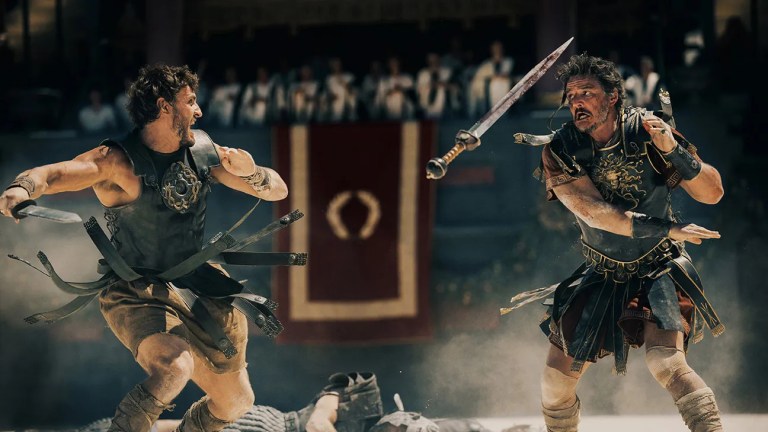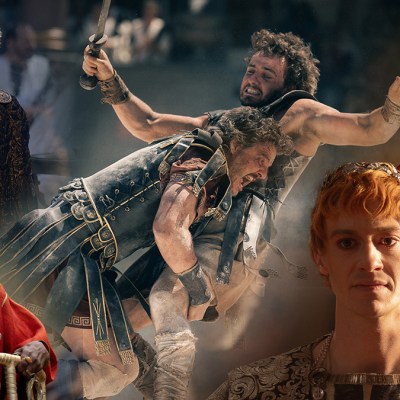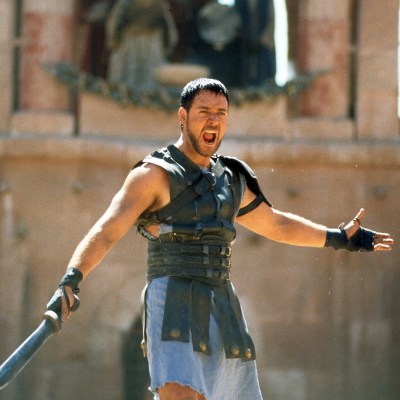Gladiator 2 Review: You Will Be Wildly Entertained and Then Some
Ridley Scott proves once again that when it comes to the Roman arena and ancient world spectacles, nobody does it better.

If you thought the Colosseum sands could soak up blood, wait until you see them covered in water. Atop a glassy shimmer of blue, various slaves, gladiators, and would-be champions make splashes of vibrant crimson and muddy rouge every time a clipped arrow sends them tumbling into the deep. But calm waters, these are not. Silent leviathans lay in wait, ready to collect felled warriors in their mouths like so much chum in a Steven Spielberg movie. Albeit even that comparison is not quite right; whereas the aquatic eating habits of monsters was the centerpiece of Jaws, such carnage is barely a drop in the bucket of the mad spectacle Ridley Scott has labored on in Gladiator II.
It’s a bloody good payoff, too, after waiting decades for Scott’s long-delayed return to Ancient Rome. It’s been a quarter-century since the director’s last foray into this era via 2000’s Gladiator, an instant classic of the sword and sandals subgenre and a film which made its lead, Russell Crowe, a global superstar and Oscar winner. (Scott also won the Best Picture prize despite the Academy in its inscrutable wisdom failing to even nominate the British auteur for Best Director.) For many, including this critic, the seminal affection for Gladiator would make a sequel seem intimidating to the point of folly. But not to Scott, who at the age of 86 tackles Gladiator II with not only the relish of a man of half his age, but also the drive of Scott at half his age—or at least a sizable chunk of it.
Not since 2005’s perennially underrated Kingdom of Heaven has Scott’s visual imagination seemed so unchained in a pseudo-historical context, and his frequent showmanship so honed in its determination to leave audiences wowed. Gladiator II is a visual smorgasbord of such craftsmanship and gourmet splendor that it could only be borne in this century from Scott’s hand. It has the grandiosity of Golden Age Hollywood at its most decadent—and perhaps all the indulgence and narrative flimsiness of that bygone age as well.
At a glance, the film seems a simple tale. Roughly 20 years after the events of the original movie, the once sweet young boy who would be emperor, Lucius (Spencer Treat Clark then, Paul Mescal now), has aged into a cynical, rage-filled exile who would rather raise a sword against Rome than a hand in homage. That’s because during the film’s opening sequence in Numidia—a kingdom in North Africa and allegedly the last bit of land in the Mediterranean not conquered by Imperial Rome—Lucius is part of a last stand of free men and women.
Yet conquered they are in a siege battle along their city’s sea walls. In the aftermath, Lucius (who is living under a pseudonym) discovers his wife died fighting the Romans, and a Roman general who knew Maximus, Marcus Acacius (Pedro Pascal), has taken their port in the name of the People and Senate of Rome. In truth, though, Acacius reluctantly serves dual Emperors Geta (Joseph Quinn) and Caracalla (Fred Hechinger), twins of diverging interests. Caracalla, whose mind is insinuated to be rotted by syphilis, cares only for the distractions of his pets and gladiatorial games. Geta, conversely, is a ceaseless expansionist. The latter’s lust for blood and glory wearies Acacius and the general’s wife, good Roman Lady Lucilla (Connie Nielsen)—Lucius’ long-lost mother and a prized political pawn as the last known heir of Marcus Aurelius.
All of that palace intrigue, however, is a mystery to the newly enslaved Lucius. Bitter and bloodthirsty in his own right, Lucius hasn’t seen his mother in decades when he’s taken back to Rome in chains by Macrinus (Denzel Washington), a former slave himself who has risen to become an Ianista. Yet the cagey powerbroker has more on his mind than simply putting on a show for the Colosseum masses when he recruits Lucius into his stable, and the pair may very well have a shot at changing the power balance of Rome herself—though to what end remains clouded by all the carnage and blood splatter in the arena.
Gladiator II narratively attempts to emulate the emotional enormity of the original 2000 film while mounting an even greater melodramatic sweep. But there’s a reason producer Spielberg correctly assessed that first film to be an opera 25 years ago. That movie was a story so simple that its players could fade into myth: a father to a murdered son, a husband to a murdered wife, will have his vengeance in this life or the next. Even if he must become the one slave with the audacity to stand against an emperor.
That epic intimacy is often copied in Gladiator II but never duplicated. This is a movie which strives for the pageantry of opera but is ultimately forced to settle for the insanity of fight night during a WWE soap. It’s big, loud, and histrionic, but is more successful at making you smile than weep. This is most probably due to the screenplay by David Scarpa lacking the interiority of John Logan’s original rushed, but nigh flawless, rewrite of the 2000 predecessor. The sequel also veers more wildly from the historical record, beginning with the fact that Numidia was conquered by the Romans about 150 years before the movie starts.
Yet what the film lacks in depth it more than compensates with in eye candy. If this is a fight night, it’s the best Jupiter-damned fight you’ve seen on the big screen in an imperial age. We mentioned sharks, but there are also rhinos, man-eating baboons, and Roman cocktail parties where blood and rose pedals mingle before lazy aristocrats. An entire historical epic cycle came and went in Gladiator’s wake, yet no film or television series (even if more historically accurate) has reached the grandeur of Scott staging a garden party.
Mescal also proves to be a strong anchor in that setting. Astutely compared to Achilles by other characters in the film, grown-up Lucius is a far angrier and zealous character than Maximus, not least of all because he does not buy into the myth of Roman greatness. It’s a muscular performance, literally and spiritually, although it isn’t allowed the dimensionality of Crowe’s Maximus. Not that it needs to when so much of Gladiator II is dominated by a monumental Denzel Washington star-turn.
Washington has worked with Ridley before on American Gangster, but his performance in Gladiator II harkens closer to the ball-having the actor would display in movies with this director’s late brother, Tony. Denzel chews every square inch of Italian scenery along the Appian Way and still has the lightness of foot to dance through the streets of Rome. His smile alone could burn the city to cinders. In many ways he is both the sequel’s Oliver Reed and Joaquin Phoenix characters rolled into one, and Washington takes up so much oxygen in the film it’s a wonder there’s enough left for anyone else in the Colosseum to breathe.
This also admittedly leaves less room for many of the other characters, with Pascal’s Acacius and Nielsen’s Lucilla feeling somewhat underserved given how much should be at stake about these paternal figures being reunited, or skewered, by a prodigal son. Nonetheless, both performances add requisite nobility to the film and ground the story with enough gravitas to allow the film’s sensory pleasures to run rampant, especially whenever Washington flaunts Janty Yates’ embroidered cloaks and gowns.
It seems unlikely Gladiator II will achieve the instant iconography, or Oscar love, of its predecessor. But this is crowd-pleasing cinema at its most pleasing; a bacchanal for the eyes and ears that leaves you in a stupor from glorious excess. It’s the type of bread and circus for which we’ve gone to the theater, or the arena, since time immemorial. Like the first Caesar, Scott can say, “Veni, vidi, vici.”
Gladiator II opens on Nov. 22. Learn more about Den of Geek’s review process and why you can trust our recommendations here.


